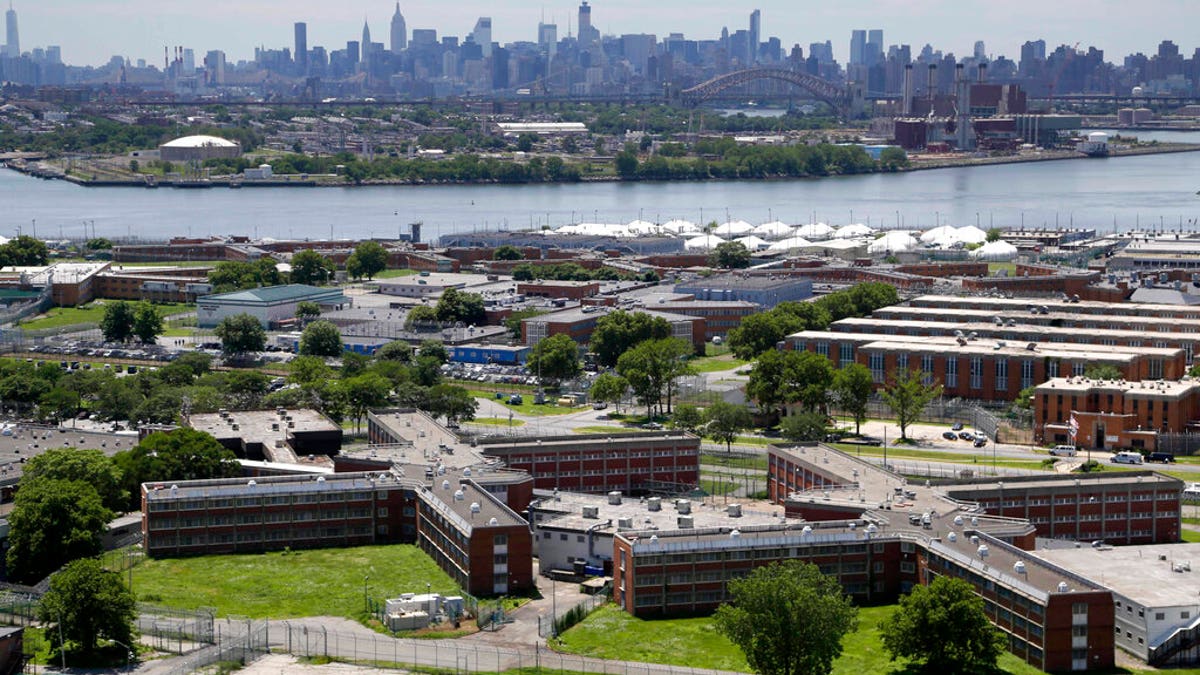Federal prison workers claim their lives are in danger during coronavirus outbreak
Employees at federal prisons are facing supply shortages during the COVID-19 pandemic as the first two workers test positive.
Get all the latest news on coronavirus and more delivered daily to your inbox. Sign up here.
At least four states in the U.S. have started to release inmates from their jails to protect vulnerable inmates as coronavirus infections have begun to appear from within.
New York City will be releasing "vulnerable" inmates who have underlying health conditions, including those who were arrested for minor crimes, according to Mayor Bill de Blasio on Wednesday.
His decision comes as an inmate at Rikers Island in the city tested positive for the virus and eight others are showing symptoms.
RIKERS ISLAND INMATE IS FIRST TO TEST POSITIVE FOR CORONAVIRUS, DE BLASIO ANNOUNCES

FILE - In a June 20, 2014, file photo, the Rikers Island jail complex stands in New York with the Manhattan skyline in the background.
(AP Photo/Seth Wenig, File)
“This inmate was in a housing unit with other inmates, all have been checked for symptoms,” de Blasio said at a news conference. "Eight have been identified with symptoms and have been moved also to isolation within the communicable disease unit."
Disgraced media mogul Harvey Weinstein will be also be moved from Rikers to a maximum-security prison located just east of Buffalo and next to the Canada border.
Other prisons in New York, including Sing Sing -- located 30 miles north of Manhattan -- have seen inmates test positive for COVID-19, according to the BBC. An employee for the state's corrections department has died from the virus.
Other states to enact measures protecting inmates so far include California, Ohio, and Florida.
Sen. Kamala Harris, D-Calif., called for “low-risk” inmates in California federal prisons to be released from custody, according to a letter sent to Federal Bureau of Prisons (BOP) Director Michael Carvajal on Thursday. Her decision comes after two prisoners in the state are in quarantine after coming in contact with a person who tested positive for coronavirus.
“In the midst of this crisis, BOP should be taking reasonable steps to reduce the incarcerated population and guard against potential exposure to coronavirus,” Harris said. “At this time, BOP -- in coordination with the U.S. Department of Justice -- can and should request the release of low-risk individuals who are in pretrial detention because of money bail.”
The Los Angeles County Sheriff's Department has reduced its inmate population by 600 in the last two weeks, officials said on Tuesday, according to the BBC.
KAMALA HARRIS WANTS 'LOW RISK' INMATES RELEASED AMID FEARS OF COVID-19 SPREADING IN PRISONS
"Our population within our jails is a vulnerable population just by who they are, where they are located, so we're protecting that population from potential exposure," Los Angeles Sheriff Alex Villanueva told reporters earlier this week.
Cuyahoga County in Ohio -- where Cleveland is located -- has also released hundreds of prisoners due to coronavirus concerns.
Judges held emergency hearings through the weekend to settle plea deals, release inmates or send them to prison, or release them on house arrest, according to Cleveland's FOX 8.
“The goal of this is to protect the community and the safety of the inmates,” the judge told the station. “If someone’s a serious violent person, well, we’re using our discretion to make sure the community’s safe also."
In Florida, the sheriff of Hillsborough County -- located in the Tampa Bay area -- announced the release of over 100 "low-level" offenders on Thursday. The county saw one of Florida's first two cases back on March 1.
OHIO JAIL TO RELEASE HUNDREDS OF INMATES AMID CORONAVIRUS CONCERNS: REPORTS
Sheriff Chad Chronister said 164 inmates will be released to protect the remaining inmate population and employees from the virus.
"These defendants are the lowest public-safety risk and were merely sitting in jail because they could not afford to pay the amount it would take to bond out," he explained during a news conference, according to Tampa's FOX 13. "These defendants will still have to answer to the charges against them."
A reason prisons can be dangerous amid the coronavirus outbreak includes the lack of healthcare supplies, restraints on inmates, and being stuck in close proximity with others.
Handcuffed people usually cannot protect their coughs or sneezes, sinks often lack soap and hand sanitizer is considered contraband due to its alcohol content, the BBC reported.
CLICK HERE FOR MORE CORONAVIRUS COVERAGE
In the U.S., all 50 states plus the District of Columbia have reported confirmed cases of COVID-19, tallying over 14,250 illnesses and at least 205 deaths.
Fox News' Vandana Rambara, Andrew O'Reilly and Danielle Wallace contributed to this report





















